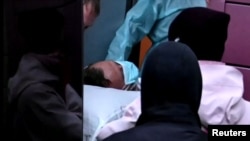German medical investigators have found “unequivocal proof” that Russian opposition activist Aleksei Navalny was poisoned by “a chemical nerve warfare agent” from the Novichok group, the German government has announced.
German Chancellor Angela Merkel condemned the poisoning as "the attempted murder" of "one of Russia's leading opposition figures."
“There are very serious questions now that only the Russian government can answer, and must answer,” Merkel said.
Russian President Vladimir Putin’s spokesman, Dmitry Peskov, told the state-run TASS news agency on the afternoon of September 2 that the Kremlin has not yet received any information about Navalny's laboratory results.
German Foreign Minister Heiko Mass summoned Russia's ambassador to discuss the matter, and said that he demanded a complete investigation of the poisoning "in full transparency."
“We now know that there was an attack with a chemical nerve agent,” AP reported Mass as saying. “That makes it even more urgent to determine who was responsible in Russia and to hold them to account.”
Mass stated on August 28 that Berlin will impose “diplomatic sanctions” on Russia if it establishes that the Russian government played a role in the poisoning of Navalny.
The 44-year-old Navalny, arguably Russia's most prominent opposition activist, was evacuated to Berlin’s Charite-Universitatsmedizin hospital on August 22 after spending roughly two days at a hospital in the Siberian city of Omsk, where his Moscow-bound flight had made an emergency landing on August 20 after he passed out on board.
Russian physicians had asserted that their laboratory tests on Navalny showed no signs of poisoning.
A toxicology laboratory run by the Bundeswehr, the German armed forces, conducted the test on Navalny’s samples in Berlin that showed signs of a Novichok poisoning. No further details about its findings have been provided.
The Russian government has demanded that Germany provide information about its tests for drugs, poisons, heavy metals, and cholinesterase inhibitors, Reuters reported, citing the Russian RBC outlet.
Novichok is a chemical nerve-agent developed by the Soviet Union, but later also produced by Russia. Part of one laboratory involved in Novichok’s development was torn down after the 1997 Chemical Weapons Convention went into force, but Moscow has never officially acknowledged its production of the military-grade agent.
If confirmed by additional analyses, Navalny’s poisoning would prove the second time in just over two years that individuals at odds with the Russian government have been poisoned by agents from the Novichok group. In early 2018, a former Russian military intelligence officer, Sergei Skripal, and his daughter, Yulia, were both poisoned with Novichok in the British city of Salisbury.
The Skripals recovered, but two other people also came into contact with the poison. One of the two later died.
During Navalny’s time at Omsk Emergency Hospital No. 1, his associate Ivan Zhdanov claimed that a police officer in the hospital had commented that a “poison dangerous not only for him, but for those around him” had been found in the activist. Medical staff never confirmed the report.
Moscow categorically denied any role in these poisonings, and attributed the international outcry to a Western smear campaign.
It has also rejected the notion that the Kremlin would plan an attack on Navalny.
Navalny has been comatose since August 20, though has begun to show signs of improvement after undergoing treatment for poisoning by a a cholinesterase inhibitor, which affects the nervous system. He remains on a ventilator in intensive care.
The Charite hospital stated on September 2 that the "long-term effects" of his "severe poisoning" cannot yet be assessed.





